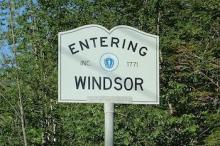Small Massachusetts Town Moves Closer to Muni Fiber
The small town of Windsor is joining the list of communities in western Massachusetts who are taking measures to improve local connectivity with publicly owned Internet infrastructure. The town of fewer than 1,000 people anticipates connecting all residents and businesses before the end of 2019.
Grants Are So Good
Windsor is benefitting from a grant of more than $886,000 from the FCC Connect America Fund, to be distributed over a 10-year period. Six other Berkshire County communities will also receive funding from the FCC; Westfield Gas+Electric (WG+E) applied for the funding on behalf of the region’s communities. In total, the seven towns will receive more than $2.45 million during the next decade to improve local broadband. The Westfield utility has been working with its neighbors in recent years in different capacities, including as an ISP, network operator, and as consultants.
Community leaders originally estimated Windsor’s planned Fiber-to-the-Home (FTTH) network would cost approximately $2.3 million. Select Board Member Doug McNally said that the community may use the award from the FCC to help pay down debt to deploy the network or may be used directly to help residents who have long driveways, requiring more individual investment to connect to the town’s network.
Windsor also received approximately $830,000 from the state in 2017 and previously approved borrowing to fund deployment. Windsor had planned to work with the WiredWest cooperative, until the Massachusetts Broadband Institute (MBI) put up several hurdles that interfered with the cooperative’s ability to realize their business model. WiredWest has revamped what it plans to offer member towns and, according to McNally, Windsor may contract with the co-op for Internet access and operate the network.
If Windsor chooses WiredWest, subscribers could choose between symmetrical packages of 25 Megabits per second (Mbps) for $59 per month or 1 gigabit per second for $75 per month. Voice service would cost an additional $19 per month. All subscribers also pay an additional $99 activation fee.



